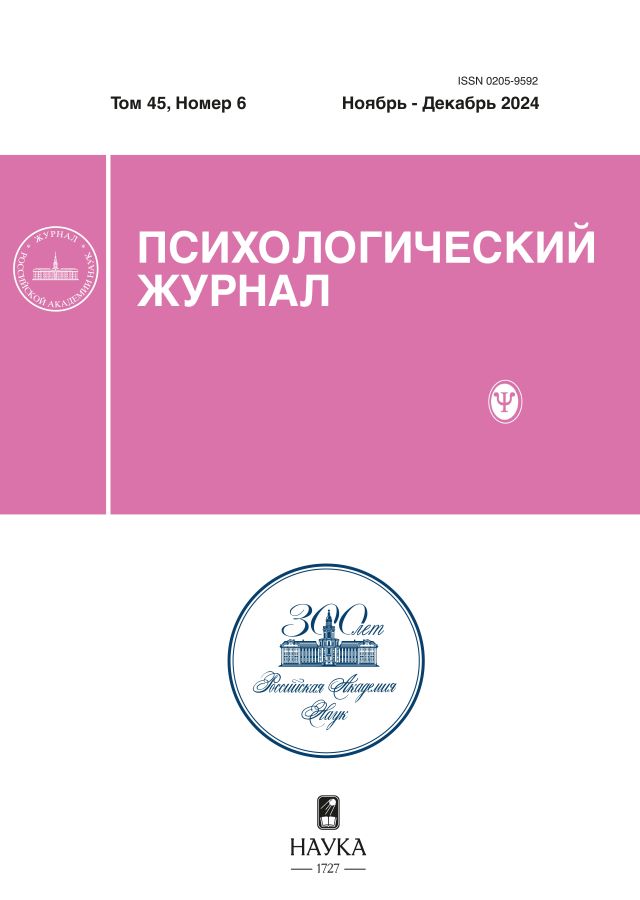Psychological Effects Early Socialization in Families with an Employee — Nanny
- 作者: Drobysheva T.V.1
-
隶属关系:
- Institute of Psychology of the Russian Academy of Sciences
- 期: 卷 45, 编号 6 (2024)
- 页面: 54-62
- 栏目: Social psychology
- URL: https://rjonco.com/0205-9592/article/view/677581
- DOI: https://doi.org/10.31857/S0205959224060056
- ID: 677581
如何引用文章
详细
The specifics of socialization processes in families with an employee (nanny) depend on the interaction between mother, nanny and child. The relationship between mother and child in such families indicates signs of partial maternal deprivation. Mother indirectly contributes to the formation of a reliable attachment between nanny and child by delegating her responsibilities for the care of the baby to the employee. Children raised in such families’ experience difficulties in interacting with their peers in future. Methodologically, we relied on the theory of attachment by J. Bowlby, especially his ideas about “monotropy”, the sensitive period of formation of maternal attachment, the importance of attachment relationships in the cognitive, social and emotional development of a child. In the context of early socialization in a family with an employee (nanny) children develop signs of partial maternal deprivation. This can lead to the peculiarities of the images of the mother and father in the representations of children and manifest themselves in interaction with peers. The psychological effects of early socialization in families with nannies are explained by the action of a complex reason — the mother’s willingness to delegate her duties to the nanny, the style of professional interaction between the nanny and the child, and the peculiarities of the child’s self-attitude.
全文:
作者简介
T. Drobysheva
Institute of Psychology of the Russian Academy of Sciences
编辑信件的主要联系方式.
Email: DrobyshevaTV@ipran.ru
ScD (in Psychology), Leading Researcher
俄罗斯联邦, 129366, Moscow, Yaroslavskaya St., 13, Bldg. 1参考
- Boulbi J. Privyazannost’. Moscow: Publ. house “Gardariki”, 2003. 477 p. (In Russian)
- Burmenskaya G.V. Mirovospriyatie detei s raznymi tipami materinskoi privyazannosti k materi. Vestnik moskovskogo universiteta. Serija 14. Psikhologiya. Psychology. 2011. № 2. P. 21–35. (In Russian)
- Gusenko M. V Rossii rezko vyros spros na nyan’. Zhenshchiny toropyatsya vyiti na rabotu posle dekreta. Rossiiskaya Gazeta. URL: https://rg.ru/2023/10/17/na-horoshee-vmesto.html (Accessed 30.07.2024) (In Russian)
- Drobysheva T.V. Obraz ottsa v predstavleniyakh detei s raznymi usloviyami sotsializatsii v sem’e. Eds. A.V. Makhnach, K.B. Zuev. Sem’ya, brak, roditel’stvo v sovremennoi Rossii. V. 2. № 2. Moscow: Publ. house “Institut psikhologii Rossiiskoi akademii nauk”, 2015. P. 58–67. (In Russian)
- Drobysheva T.V., Butyakova I.V. Obraz materi v predstavleniyakh detei s chastichnoi materinskoi deprivatsiei. Eds. I.V. Zavgorodnyaya, O.P. Makushina. Lichnost’ v sovremennom obshchestve: psikhologicheskie problemy i perspektivy razvitiya: Sbornik nauchnykh trudov. Voronezh: Izd-vo “Poligraficheskii tsentr Voronezhskogo gos. un-ta”, 2013. P. 420–423. (In Russian)
- Zhuravlev A.L. Psihologiya sovmestnoj deyatel’nosti. Moscow: Izd-vo “Institut psihologii RAN”, 2005. 640 p. (In Russian)
- Zhuravlev A.L. “Social’no-psihologicheskaya zrelost’”: obosnovanie. Psikhologicheskii zhurnal. 2007. V. 28. № 2. P. 44–54. (In Russian)
- Zdravomyslova E.A., Temkina A.A. 12 lektsii po gendernoi sotsiologii: uchebnoe posobie. Saint Petersburg: Izdatel’stvo Evropeiskogo universiteta v Sankt-Peterburge. 2015. 768 p. (In Russian)
- Kalina O.G., Kholmogorova A.B. Rol’ ottsa v psikhicheskom razvitii rebenka. Moscow: Forum, 2011. 112 p. (In Russian)
- Romanovskaya M.A. Sotsial’no-psikhologicheskie svoistva lichnosti v usloviyakh rannei sotsializatsii v sem’e s naemnym rabotnikom (nyanei): dis. ... kand. psikhol. Nauk. Moscow, 2020. 182 p. (In Russian)
- Sergienko E.A., Ulanova A. Yu., Lebedeva E.I. Model’ psikhicheskogo: struktura i dinamika. Moscow: Publ. house “Institut psikhologii Rossiiskoi akademii nauk”, 2020. 503 p. (In Russian)
- Sergienko E.A. Problema sootnoshenij ponyatij sub”ekta i lichnosti. Psikhologicheskii zhurnal. 2013. V. 34. № 2. P. 5–16. (In Russian)
- Akay N. The family dynamics in nanny-employed families and their impact on the cared child. A Thesis Submitted to the Graduate School of Social Sciences of Middle East Technical University, 2022. doi: 10.13140/RG.2.2.23612.31369
- Bonsra V. I’ve become the nanny, tutor and cleaner merged into one; Female nannies’ experiences of working for families during the COVID-19 lockdown: An Interpretative Phenomenological Analysis. Thesis for BSc in Child psychology. Cardiff University, May 2021. doi: 10.13140/RG.2.2.29699.84009
- Hoiting I. Triangulations of “motherly love”: Negotiated ıntimacies among migrant domestic workers, mothers, and children. Journal of Family Issues. 2022. V. 43. № 2. P. 324–349.
- Macdonald C.L. Shadow Mothers: Nannies, Au Pairs and the Micropolitics of Motherhood. Berkley CA: University of California Press, 2010.
- Prout T.A., Cohen T. What Happened to the Nanny? Parental Reflections on Secondary Caregiver Loss. Journal of Infant, Child, and Adolescent Psychotherapy. 2020. V. 19. № 4. P. 427–441. doi: 10.1080/15289168.2020. 1803667
- Rohmalina R., Suryono Y., Fauziah P. The Role of the Father in the Early First Year of Early Childhood’s Life. Digital Press Social Sciences and Humanities. 2021. V. 7(00015). doi: 10.29037/digitalpress.47405
- Yakeley J. Mind the baby: The role of the nanny in infant observation. The International Journal of Psychoanalysis. 2017. V. 98. № 6. doi: 10.1111/1745-8315.12631
- Vakrat А., Apter-Levy Y., Feldman R. Sensitive Fathering Buffers the Effects of Chronic Maternal Depression on Child Psychopathology. Child Psychiatry & Human Development. 2018. URL: https://doi.org/10.1007/s10578-018-0795-7 (date of access: 20.03.2024).
补充文件









